Are We Entitled to Make a Living Doing What We Love To Do?

The movie 20 Feet From Stardom – and if you haven’t seen it, you should – has sparked many conversations with my musical brethren, most of whom point to two scenes that they found particularly poignant, both involving the amazing vocalist Merry Clayton. Never heard of her? Don’t worry about it. You have, in fact, heard her.
The first aforementioned scene shows Clayton and Mick Jagger listening to the isolated vocal track of Clayton’s performance on The Rolling Stones’ song, “Gimme Shelter.” It’s one of those performances that summons emotions in me that I’m unable to put into words. Hearing the track, coupled with watching the singers respond to it, gave me chills and brought me to tears. Just thinking about it gives me the chills. Not too shabby for a song I’ve probably heard a couple hundred times.
The second scene has Clayton recalling how her attempts at stardom in the 70s resulted in three albums that sold poorly. She says, her voice cracking, “I felt like if I just gave my heart to what I was doing, I would automatically be a star.”
No one could blame her or countless others for this belief. After all, we hear it all the time: Follow your dream. Do what you love. Cinderella sang about it. So did Aerosmith and a thousand other bands. Hell, even I’ve written about it. Graduation speeches promote it. Websites are devoted to it. An industry of inspiring posters capitalizes on it. It’s what parents want for their children. It’s what children want for themselves when they become adults. And I think there’s a kernel of good advice in that sentiment. Do what you love to do.
And yet…
Are we entitled to make a living at it? What a luxury it is to even be asking the question! In the history of humankind, how long has this idea of doing what one loves to do for a living been given even the slightest consideration? For me, it brings to mind centuries of apprentices toiling in atrocious working conditions, slaves enduring worse, millennia of farmers laboring over the land, generations of immigrants, past and present, suffering through the most strenuous jobs for the littlest of pay.
I wonder how many people historically have had the luxury of saying, “I want to do this for a living.” How many people living today can devote a realistic thought to the notion? The starving worry about food, the terrorized worry about safety, and the poor worry about making a better living.
So the fact that some of us are able to entertain the notion of doing what we love to do is already a blessing of blessings. Let’s start there. But should we be able to make a living doing what we love to do? Well, that all depends, doesn’t it? I could get into an analysis I suppose of capitalism, supply, demand, education, market saturation, etc., but what it all comes down is that sometimes jobs are in demand, sometimes they aren’t, and sometimes there’s never demand for what you love to do.
Our grandparents, especially those who were the first in their family to go to college, probably didn’t give this a second thought, and majored in what was going to guarantee them a job. Right now, it seems like nursing is a good profession to go into. I have a niece pursuing this as I write, and her prospects look good. In a decade, who knows? Engineering looks very promising at present. Architecture, not so much. Then again, I know an architect in Milwaukee who is living her dream. You just never know. The entertainment industry, of course, is even more fickle. Some musicians can make a decent living at it. Others become superstars. Others still can barely get by. It isn’t fair, but that’s the way it is. In 20 Feet from Stardom, singer/songwriter Stings says, “It’s not about fairness. It’s not really about talent. It’s circumstances. It’s luck. It’s destiny. I don’t know what it is.”
And shouldn’t this be the case? After all, if I could make a living watching baseball on TV, I would do it in a heartbeat. I know people who love to fish. Does that mean they should be earning a living at it? I know people who love nothing more than to play a round of golf. Does that mean they should get paid for it?
For me, I think the answer is this: do what you love. Pursue it. Immerse yourself in it. And if you’re able to, do it for a living. But either way, don’t stop. I stopped playing music and writing fiction for a while back in ’94 and ’95, and then again in the early 2000s. You know what? I found myself out of sorts. Unfulfilled. Unpleasant at times. Well, duh. I wasn’t doing what I loved to do. Now I make a little supplemental family income and I get to write fiction and play with fabulous musicians and create good – sometimes great – music. It isn’t superstardom, but so what?
I have musician friends, some of whom play or sing for a living, and it isn’t easy. I’m sure they had thoughts of stardom when they were air-guitaring in front of the mirror in 1985, but despite the difficulties, they’ve chosen to keep doing what they can to earn a living playing music. Other people I know had thoughts of stardom but decided to go into teaching or engineering or accounting. But they haven’t stopped playing.
I wish Merry Clayton had made it big. I wish lots of people had made it big. But there’s no reason they should have, just like there’s no reason I should be paid to watch baseball. That’s life. I have two daughters who in a year’s time will be majoring in fields of study that guarantee them nothing except a degree in four years. What happens beyond that is anyone’s guess. But I hope in twenty years, both of them are still pursuing their love, whether it’s during the week from 8 to 5, or on evenings and weekends. Either way, they will be successes in my book.
And you know what? Merry Clayton is a star in my book, too. To hell with superstardom.


